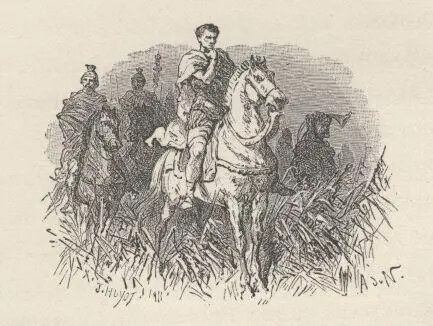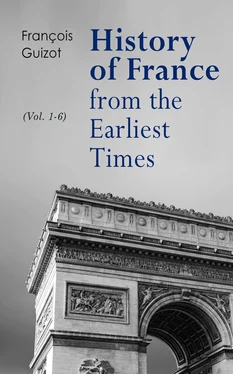François Guizot
History of France from the Earliest Times (Vol. 1-6)
Complete Edition
e-artnow, 2020
Contact: info@e-artnow.org
EAN 4064066399832
Volume 1 Volume 1 Table of Contents
Volume 2 Volume 2 Table of Contents
Volume 3
Volume 4
Volume 5
Volume 6
Table of Contents Table of Contents Volume 1 Volume 1 Table of Contents Volume 2 Volume 2 Table of Contents Volume 3 Volume 4 Volume 5 Volume 6
EXTRACT FROM LETTER TO THE PUBLISHERS.
CHAPTER I. GAUL.
CHAPTER II. THE GAULS OUT OF GAUL.
CHAPTER III. THE ROMANS IN GAUL.
CHAPTER IV. GAUL CONQUERED BY JULIUS CAESAR.
CHAPTER V. GAUL UNDER ROMAN DOMINION.
CHAPTER VI. ESTABLISHMENT OF CHRISTIANITY IN GAUL.
CHAPTER VII. THE GERMANS IN GAUL. THE FRANKS AND CLOVIS.
CHAPTER VIII. THE MEROVINGIANS.
CHAPTER IX. THE MAYORS OF THE PALACE. THE PEPINS AND THE CHANGE OF DYNASTY.
CHAPTER X CHARLEMAGNE AND HIS WARS.
CHAPTER XI. CHARLEMAGNE AND HIS GOVERNMENT.
CHAPTER XII. DECAY AND FALL OF THE CARLOVINGIANS.
CHAPTER XIII. FEUDAL FRANCE AND HUGH CAPET.
CHAPTER XIV. THE CAPETIANS TO THE TIME OF THE CRUSADES.
CHAPTER XV. CONQUEST OF ENGLAND BY THE NORMANS.
CHAPTER XVI. THE CRUSADES, THEIR ORIGIN AND THEIR SUCCESS.
EXTRACT FROM LETTER TO THE PUBLISHERS.
Table of Contents
Every history, and especially that of France, is one vast, long drama, in which events are linked together according to defined laws, and in which the actors play parts not ready made and learned by heart, parts depending, in fact, not only upon the accidents of their birth, but also upon their own ideas and their own will. There are, in the history of peoples, two sets of causes essentially different, and, at the same time, closely connected; the natural causes which are set over the general course of events, and the unrestricted causes which are incidental. Men do not make the whole of history it has laws of higher origin; but, in history, men are unrestricted agents who produce for it results and exercise over it an influence for which they are responsible. The fated causes and the unrestricted causes, the defined laws of events and the spontaneous actions of man’s free agency—herein is the whole of history. And in the faithful reproduction of these two elements consist the truth and the moral of stories from it.
Never was I more struck with this two-fold character of history than in my tales to my grandchildren. When I commenced with them, they, beforehand, evinced a lively interest, and they began to listen to me with serious good will; but when they did not well apprehend the lengthening chain of events, or when historical personages did not become, in their eyes, creatures real and free, worthy of sympathy or reprobation, when the drama was not developed before them with clearness and animation, I saw their attention grow fitful and flagging; they required light and life together; they wished to be illumined and excited, instructed and amused.
At the same time that the difficulty of satisfying this two-fold desire was painfully felt by me, I discovered therein more means and chances than I had at first foreseen of succeeding in making my young audience comprehend the history of France in its complication and its grandeur. When Corneille observed—
“In the well-born soul Valor ne’er lingers till due seasons roll,”—
he spoke as truly for intelligence as for valor. When once awakened and really attentive, young minds are more earnest and more capable of complete comprehension than any one would suppose. In order to explain fully to my grandchildren the connection of events and the influence of historical personages, I was sometimes led into very comprehensive considerations and into pretty deep studies of character. And in such cases I was nearly always not only perfectly understood but keenly appreciated. I put it to the proof in the sketch of Charlemagne’s reign and character; and the two great objects of that great man, who succeeded in one and failed in the other, received from my youthful audience the most riveted attention and the most clear comprehension. Youthful minds have greater grasp than one is disposed to give them credit for, and, perhaps, men would do well to be as earnest in their lives as children are in their studies.
In order to attain the end I had set before me, I always took care to connect my stories or my reflections with the great events or the great personages of history. When we wish to examine and describe a district scientifically, we traverse it in all its divisions and in every direction; we visit plains as well as mountains, villages as well as cities, the most obscure corners as well as the most famous spots; this is the way of proceeding with the geologist, the botanist, the archeologist, the statistician, the scholar. But when we wish particularly to get an idea of the chief features of a country, its fixed outlines, its general conformation, its special aspects, its great roads, we mount the heights; we place ourselves at points whence we can best take in the totality and the physiognomy of the landscape. And so we must proceed in history when we wish neither to reduce it to the skeleton of an abridgment nor extend it to the huge dimensions of a learned work. Great events and great men are the fixed points and the peaks of history; and it is thence that we can observe it in its totality, and follow it along its highways. In my tales to my grandchildren I sometimes lingered over some particular anecdote which gave me an opportunity of setting in a vivid light the dominant spirit of an age or the characteristic manners of a people; but, with rare exceptions, it is always on the great deeds and the great personages of history that I have relied for making of them in my tales what they were in reality—the centre and the focus of the life of France.
GUIZOT.
VAL-RICHER,
December, 1869.

Table of Contents
The Frenchman of to-day inhabits a country, long ago civilized and Christianized, where, despite of much imperfection and much social misery, thirty-eight millions of men live in security and peace, under laws equal for all and efficiently upheld. There is every reason to nourish great hopes of such a country, and to wish for it more and more of freedom, glory, and prosperity; but one must be just towards one’s own times, and estimate at their true value advantages already acquired and progress already accomplished. If one were suddenly carried twenty or thirty centuries backward, into the midst of that which was then called Gaul, one would not recognize France. The same mountains reared their heads; the same plains stretched far and wide; the same rivers rolled on their course. There is no alteration in the physical formation of the country; but its aspect was very different. Instead of the fields all trim with cultivation, and all covered with various produce, one would see inaccessible morasses and vast forests, as yet uncleared, given up to the chances of primitive vegetation, peopled with wolves and bears, and even the urns , or huge wild ox, and with elks, too—a kind of beast that one finds no longer nowadays, save in the colder regions of north-eastern Europe, such as Lithuania and Courland. Then wandered over the champaign great herds of swine, as fierce almost as wolves, tamed only so far as to know the sound of their keeper’s horn. The better sort of fruits and of vegetables were quite unknown; they were imported into Gaul—the greatest part from Asia, a portion from Africa and the islands of the Mediterranean; and others, at a later period, from the New World. Cold and rough was the prevailing temperature. Nearly every winter the rivers froze sufficiently hard for the passage of cars. And three or four centuries before the Christian era, on that vast territory comprised between the ocean, the Pyrenees, the Mediterranean, the Alps, and the Rhine, lived six or seven millions of men a bestial life, enclosed in dwellings dark and low, the best of them built of wood and clay, covered with branches or straw, made in a single round piece, open to daylight by the door alone, and confusedly heaped together behind a rampart, not inartistically composed of timber, earth, and stone, which surrounded and protected what they were pleased to call a town.
Читать дальше













